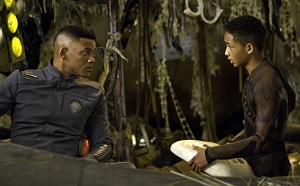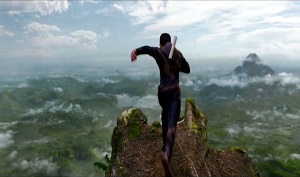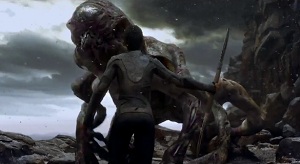|
And here we go again. Once-lauded auteur M. Night Shyamalan's first film since the critical disaster that was The Last Airbender arrived on the scene in a curious fashion: in contrast to previous ad campaigns, the film's trailers noticeably made no mention of the director, whose name was formerly displayed in a loud-and-proud fashion in promotionals for his films. After a string of quite terrible movies, his moniker no longer has quite the same effect as once it did, with cheers turning to jeers in audience reactions. I am not one who takes any pleasure in his fall from grace; I'd rather he made good movies, as enjoying a good movie is far more fun than bitching about a bad one. Regrettably, it's kind of hard to do either in this case. After Earth is probably the man's best work since Unbreakable, but considering the quality of the films in between, that's not saying as much as one would hope. 
Will Smith leads the cast in a man-against-nature fight for survival. I'd like to say it was awesome, that it blew me away, but such is the nature of disappointment. The real star of the film is Smith's son Jaden, as his father, despite being the big-name draw, does relatively little. The elder Smith is Cypher Raige, a ranger who excels in the skill of "ghosting," or the ability to mentally rein in fear. This is a handy skill to have when your colony planet is overrun by aggressive beasties who, though being blind and deaf, can smell the biological changes occurring within a frightened organism. Jaden plays his screen son Kitai, whom we meet as the issue-ridden lad fails to qualify as a ranger himself. "Kitai," incidentally, is Japanese for "hope;" it's probably best not to dwell on the meaning of "cypher" where character types are concerned. The pair are on an interstellar trip when an accident brings their ship down on their ancestral homeworld Earth, now an abandoned planet with an environment hostile to humankind. The inexperienced Kitai must make a hazardous trek across the landscape of this future Earth to retrieve a homing beacon in a distant section of the shattered spacecraft before his wounded father succumbs to his injuries. (As the film begins with a scene of Cypher falling victim to the sort of traumatic crash that would kill anyone in real life, and his skill is known as "ghosting," there's an almost inevitable sense of worry that perhaps it will turn out that dear old Dad is really dead for the whole film. He's not. Let me just allay that fear right off the bat.)  There are things to like about After Earth. The vistas of the post-human Earth are beautiful, if often implausible (just how high is that damn cliff, anyway?), and there's some neat design work to be found in the technology presented -the doomed spacecraft effectively gives a sense of advanced design, with some parts seemingly made of paper; it's not quite like any other filmic spaceship I've seen before. Underneath its sci-fi veneer, the story centers on the emotional distance between father and son. Physically separated by Kitai's desperate journey, with only a two-way radio serving as a connection, the longstanding disconnect between the two begins to boil over as the son moves further along his journey. In a well-conceived scene, Kitai suddenly lashes out over his sense that Dad blames him for failing to save his sister when one of the vicious fear-sniffers entered their home years before. The dialogue does not directly introduce the subject; one feels it has been roiling just below the surface since it happened. But the package as a whole does not cohere well. The story feels simultaneously overdeveloped and underdeveloped; the script keeps tossing in fragments of ideas it does not imbue with much clarity or detail. The fear-seeking Ursas are particularly problematic. The blind and deaf nature of these creatures is already implausible (sure, they can hunt, but how do they not just blunder off of cliffs or charge straight into fearless trees?), but it's made worse by also giving them chameleon-like abilities. They can't see you if you don't fear them, but if you can't see them, you won't be afraid. Furthermore, why do the rangers combat these creatures with swords instead of any kind of firearms? The whole ghosting concept is also hard to buy into as presented. Yes, the standard hero's journey is about courage, but just switching off fear as an act of will is not something that comes to you simply because you need it. Indeed, the parameters of "succeed at this task, or you're dead" are precisely the kinds of circumstances that heighten fear the most. 
Perhaps the oddest factor concerning After Earth revolves around the presence of Earth itself. When all's said and done, the inclusion of Earth as the site of the crash landing is totally unimportant to the story, as any wholly made-up hostile planet would've served the premise equally well. We expect some significance to the choice, be it a discovery necessarily unique to this future Earth, or some subtextual commentary on environmental issues, which never comes. Dialogue also carries that familiar Shyamalan ring, veering from the overwrought, such as Cypher's attempt at describing the "true nature" of fear, to leaden, e.g. "Your son doesn't need a commanding officer; he needs a father." He could also use a dialogue coach, and M. Night could use a scriptwriter other than himself. Can someone get on that, please? -review by Matt Murray
|
|
||||||||